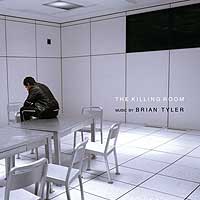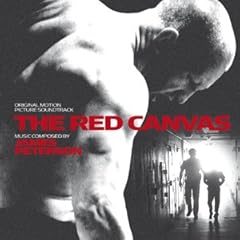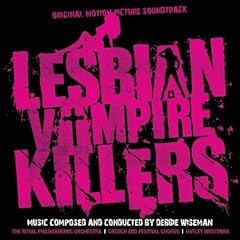
AVATAR - James Horner
Avatar. Where to begin?
It's not one of the greatest cinematic achievements of our time, like Hollywood would like you believe. Nor is it one of the worst films made, like bitter internerd fanboys would like you to believe either. It's simply an evenly told adventure story, that tries a little too hard to preach eco-issues to the audience. Visually and technically, Avatar is simply astounding. Story and character wise it's a little dry, but it's to be expected and therefore can be forgiven if it's just a wild romp that you're seeking out. All that aside, it's James Horner's colorfully exotic adventure score that's in the spotlight here.
At first, I dismissed the Horner's score as nothing but a retread of his previous efforts and other composer's works that explored the realms of other planets and cultures. In a way, it is, but it's done with such masterful intelligence and thought, that all else is forgotten.
Horner's third collaboration with the equally egotistical, director James Cameron, is a fine one indeed, littered with some of Horner's most obvious and overused motifs and themes, which should come as no surprise to the film score community or fan of the composer's earlier work.
While the composer spoke of irregular instrumentations and textures rarely ever used in scoring procedures, nothing really stands out as being groundbreaking or original, but in all fairness, it's so well done it almost doesn't matter.
There are interesting moments of synth textures blended in seamlessly with orchestra or a tribal vocal and/or percussion section, that the regular listener probably won't pick it up upon the first few listens.
The small ethnic vocal ensemble is quite powerful indeed, as it speaks wonders with it's wordless chanting and spelling out an innocence long forgotten by the western civilization. It almost grounds the otherworldliness of the score, by the organic feel it radiates.
The obvious use of ethnic percussion and woodwinds is to be expected, but Horner also treats the ears to some more subtle ethnic playing in the more mystical sounding sections with chimes, flutes, bells and electronics that weave in and out of each other.
James Horner has written quite possibly one of the best action cues of his career right here, with the astounding 11 minute "War". If you're going to listen to anything from this film, this cue is the one to seek out, with it's dizzying orchestral blasts of brass battle cries, ethnic war calls, thundering percussion and a pulsating electronic current subtly running through the greater body of the cue.
On album, the score includes about 74 minutes worth of score, plus a 4 minute pop single that I won't get into it (because it hurts my ears and brain). The album presentation is all right, but it demands at least a two disc edition to truly explore the 2 plus hours worth of music that Horner actually wrote for the film.
I know there's an deluxe edition available now, but for only 18 minutes more music, it hardly seems worth it when one suspects a better more well rounded album presentation SHOULD become available in the future.
Honestly, I could probably write one of the longest reviews I have so far on this blog, about this score. Not because it's so good or bad, but because it's layered with so much careful planning and weaved together in several different directions so intelligently, it begs for a deeper exploration. I won't though, seeing as this is almost the length of regular review and the Oscar Nom reviews are supposed to be short......woops.
I'm glad I waited so long to review the 2009 Oscar Nominees. Had I written this last year, I probably would have only given this 3 stars and forgotten about it. However, after given it sometime to settle in within my tastes, its risen to an extremely strong 4 star rating. I tip my hat to you, Mister Horner. Your 18 months of hard work on this score does not go unnoticed.
Say what you will about the movie, but the music itself deserves all the recognition and hype it received.
****
FANTASTIC MR. FOX - Alexandre Desplat

Alexandre Desplat's work has never really struck a chord with me. While I recognized his technical brilliance, his work had always came off as sort of cold and lacking from the warmth of a heart. All that changed with his score to Wes Anderson's animated flick, based off of Roald Dahl's children's novel, Fantatic Mr. Fox.
Fox is a wonderfully, colorful array of tinkering, twinkling and twankering. A musical ride that is really quite refreshing in a year full of deeply, serious or massively epic orchestral scores.
Desplat had an absolute ball here and it's made quite apparent with the final product. He pulls out all sorts of bells and whistles, including banjos, woodwinds, glockenspiels, xylophones, chimes, a children's choir, his own whistling and a frolicking cello.
A rather pleasant theme for Mr Fox is at the forefront, telling the story of a simpler, innocent life. With a banjo serving as the heart, we are treated to some wonderful cello soloing, chimes and guitar plucking.
Desplat works in some wonderful themes for just about every character, one of which stands out as obvious nod Ennio Morricone's spaghetti western days for the Rat character. It twangs, whistles, marches and brings a smile to the face, reminding one just how much fun scoring can really be with a smaller ensemble.
Another nod to the past can be heard in a John Philip Sousa inspired march. That seems right at home, as we're reminded of Nick Park's animation, because he's made so much use of that sound in Chicken Run and his Wallace & Gromit cartoons. Monty Python enthusiasts will be reminded of The Flying Cirus and all it's silliness.
Desplat surprises with some astoundingly beautiful pieces near the end of the score, that bring in a quirky Elfman charm to the project. Here, Deslplat makes use of solo boy soprano and some chimes, which at times, takes me back to John Morris' tragic The Elephant Man score.
I should mention, PULP frontman, Jarvis Cocker has a single cue, Petey's Song, included that makes me laugh every time with it's playful ridiculousness. Cocker did end up recording 4 songs for the film, but had them ultimately cut, as he was originally the narrator of the film, but producers felt it too confusing.
All in all, Desplat's Fantastic Mr. Fox is a wonderful surprise to me, as I never really felt close to any of his scores until Fox.
While the commercial album presentation is fun, including some source songs to boot, I would highly recommend the MP3 only album, The Abbey Road Mixes, as it showcases Delsplat's delightful score only.
It's not an amazing score or one that will appeal to everyone, but I for one, was delightfully surprised and entertained by this score and will revisit in regularly.
*** 1/2
THE HURT LOCKER - Marco Beltrami & Buck Sanders
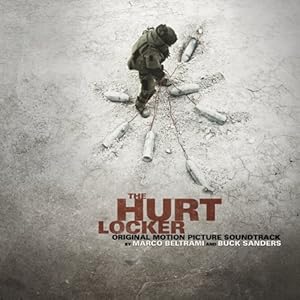
There were two scores from the 2009 Oscar Nominations that I'm glad I gave myself the chance to revisit so much later. James Horner's Avatar was the first, Marco Beltrami & Buck Sanders' The Hurt Locker is the other.
Directed by Point Break's Kathryn Bigelow, The Hurt Locker tells the story of three American soldiers on the Explosive Disposal unit, during the war in Iraq.
A score I had been eagerly awaiting for quite sometime, as Beltrami had never really composed for a war film before, The Hurt Locker, came as a complete disappointment at first.
I found it to be nothing more than a jumbled conglomeration of synth sounds, tweaked and pitch-shifted to make the ears bleed.
Giving it some time to age and repeated listens to study it some more, I found it to be so much more than that. Beltrami and longtime collaborator/soundscape artist, Buck Sanders sculpted one of the most intensely, disturbing avant-garde scores I think I've heard since Christopher Young's first 1987 Hellraiser score.
The score screams of extreme hostility from the very get go and hardly ever lets up from this unpleasantness, other than a few spots of lone depression, which isn't anymore comforting.
It attacks the senses with such precision and intensity, it's easy to see why the average score listener would hate it. It's not a fun listen at all, but it's perfect for such a film as The Hurt Locker and feels as if it's absorbed all the intensity on screen and is filtering it through your ears.
I don't know how they did it, but it's made quite obvious, through dissonant sounds and drones, which cues are meant to magnify the hostile dry, landscape that surrounds the characters and which ones rely heavily on angry, insane interiors of the minds of the main characters. How you would go on about personalizing sounds like that, boggles the minds as to how long it took the two composers to come up with what was interior and what would be exterior.
In an interesting twist, Beltrami & Sanders don't make use of the Iraqi instruments or voices by shoving the down the throats of the listeners, like Zimmer or any of his minions would do. They don't need to let the viewer know which country the film takes place in, by rocking out with an oud or a rebab to a hip hop beat. Instead, they mute the instrumentation and vocals to be heard in the background, almost as they're attempting to invade the characters heads over a wall of noise and insanity.
Not all is angry screeches and electronic pulses though. Interestingly enough, a Western like theme is created for the cowboy like main character, Sgt. James, deliciously played by Jeremy Renner. No stranger to beautiful Western music, Beltrami & Sanders craft a depressing, lonely little piece using an e-bow and 3 slightly different tones on an electric guitar.
This score is immensely threatening and makes no attempt to pretend to be anything but. Beltrami & Sanders took this project with a perfect approach with industrious "noise", when a straightforward musical score, would have made too much sense and by no means, are we or the characters to be making sense of such a situation.
The Hurt Locker is angry, noisy, depressing and constantly reminding the listener that you are alone...Beltrami & Sanders capture that perfectly.
It could have easily been nothing but a noisy synthesized mess with one slight misstep, but the two composers handled it so well and closely, it actually comes off as genius and well thought out.
At first, I figured their score was nominated solely because it was attached to 2009's darling film, The Hurt Locker (who would nominate something so avant-garde for an Academy Award?). Now I would like to believe it was nominated because it deserved it for capturing the feel of the film to a tee (doubtful still, but that's really why it deserves the nom).
Beltrami & Sanders' score is a very difficult listen that won't appeal to many, but if you have the patience for it, it is extremely rewarding as it twists your emotions into a tense knot of anger, confusion and takes you completely out of your comfort zone.
I love it.
*** 1/2
SHERLOCK HOLMES - Hans Zimmer
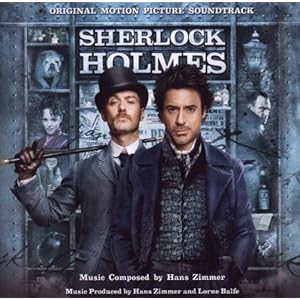
On paper, director Guy Richie tackling the Sherlock Holmes character in a new film seemed really weird. Casting Robert Downey, Jr. and Jude Law in the iconic lead roles seemed even weirder. Hiring composer Hans Zimmer on a Guy Richie project (most of all this project) sealed the deal as 'weird'.
...And the best part about such a project? It all worked out in the end.
Upon the first listen, the main theme sounds a lot like Jack Sparrow's theme from Pirates Of The Caribbean. Which can be forgiven, as both Holmes and Sparrow are comedic, eccentric and pompous characters that call for such a theme.
Here Zimmer focuses on a playful cimbalom and a famously detuned piano (which Zimmer threw down a flight of stairs) as the central instruments for Holmes' main theme. It works extremely well, as a wild, slightly off-kilter romp, with some mystery sprinkled into for obvious reasons.
Zimmer tosses in some bizarrely played solos by a screeching violin and fiddle, to boot there's also a drunken accordian jig, some tubas, a banjo and bagpipes and in a stroke of pure offbeat genius, the Westminster Chimes even makes an appearance.
For the most part, Holmes, sounds as if Gogol Bordello came along and covered The Pogues with an array of broken instruments. I don't know if this was intentional or not, considering Richie's close friendship with Gogol Bordello, but I'm suprised to see that I'm the first one to mention this.
I might go so far as to say Sherlock Holmes sounds like a certain type of pure madness, that usually comes attached to genius, which is perhaps what Zimmer was aiming for. The character of Sherlock Holmes was supposed to be a bit of a madmen, cursed with a generous amount of intelligence.
Holmes comes off as a style Zimmer does not visit often and I wish he would more often. It sprinkles in flavors of some of his previous efforts, including An Everlasting Piece, The Peacemaker and of course Pirates.
This score, like Mr. Fox, isn't for everybody. In fact, I'm willing to bet, most Zimmer fanboys who loved his work with Christopher Nolan, will be left confused and wondering where the "epic manboy" music is.
I love this score and quite frankly is an easy one to get excited about. It's fun, crazy and loud.
Let's hope Zimmer keeps on writing surprises like this more often.
****
UP - Michael Giacchino

I've all ready gushed over this score in an earlier post. So I should think it's quite obvious that I think Giacchino's UP should (and was) be the the winner of the Oscar for Best Score.
Since I've all ready expressed my feelings for this wonderful modern classic, why not post what other more respected score reviewers thought of it?
"Giacchino's UP gets a huge "thumbs up" from me. Big ups for not being afraid to return to "good, old fashioned" scoring techniques that have made classic animation features endure the tests of time and trend."
-Christopher Coleman, Tracksounds
"Giacchino's music, being completely acoustic and orchestral, has an organic nature to it which is refreshing in and of itself, but he goes one step further by employing colorful orchestral techniques and instrumentations which give his scores a completely delightful flavor."
-David Abraham Dueck, suite101
"Giacchino has done extremely well scoring Up, as it would have definitely been a difficult film to compose, since getting the mix of simple French street music and the grandiose of an orchestra to combine together is not an easy task, it has been done superbly and it has really captured the emotive pictures that are being projected onto the screen."
-Doug Belfast, Sputnik Music
"Buy it if your heart was broken by the tragic whimsy of Michael Giacchino's theme for the primary couple in the context of Up, its combination of vintage jazz and waltz rhythms both affably light-hearted and remarkably intimate at the forefront of the film's mix."
-Christian Clemmenson, Filmtracks
"Up is a wonderfully entertaining and enjoyable score, illustrating perfectly Giacchino's lighter, thematic side, and more than confirming his newly acquired status as one of Hollywood’s rising music stars."
-Jon Broxton, Movie Music UK
....
...I urge you to check this one out. URGE.








